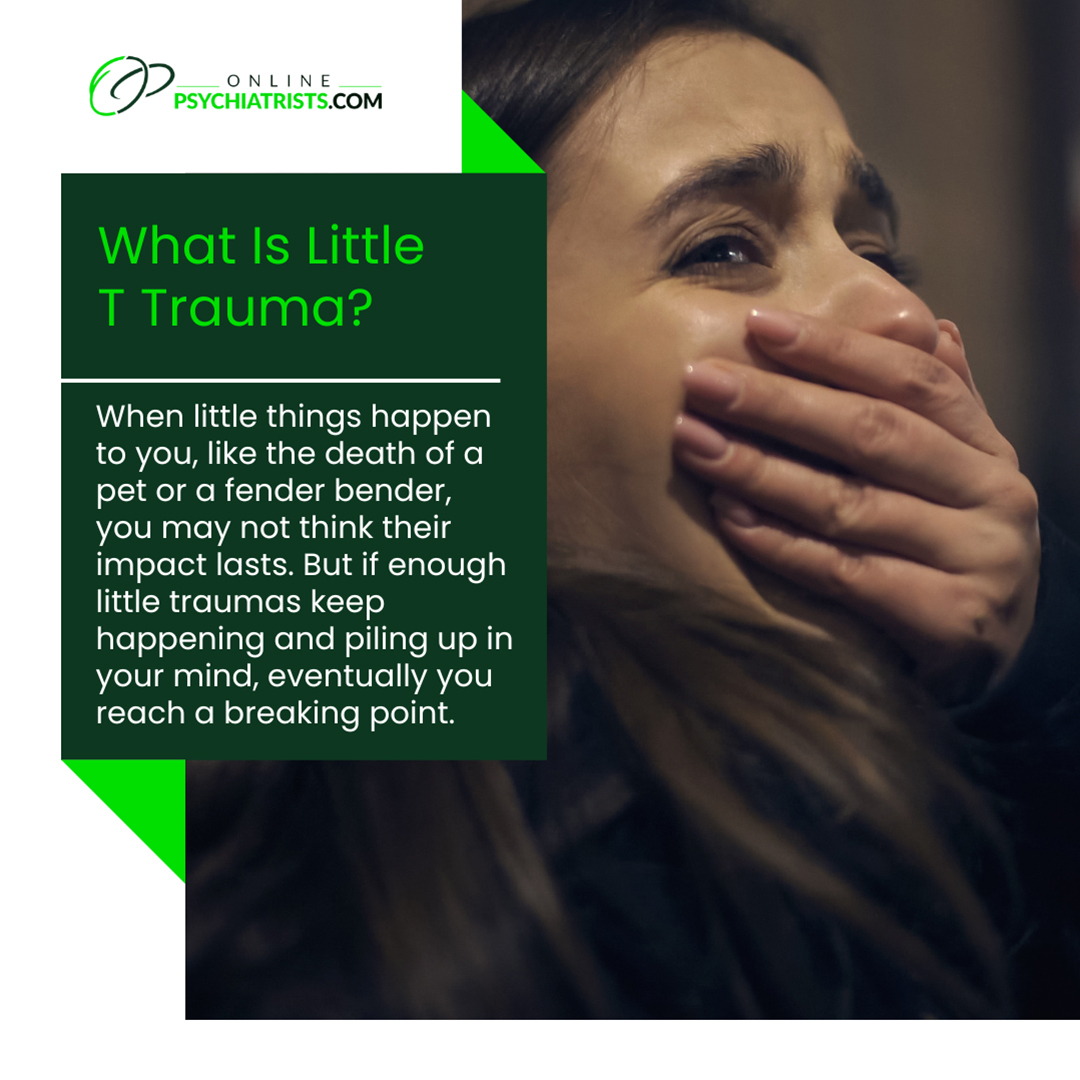

Table of contents
When little things happen to you, like the death of a pet or a fender bender, you may not think their impact lasts. But if enough little traumas keep happening and piling up in your mind, eventually you reach a breaking point. The symptoms come on slowly, as the events occur over time, so you may not even be able to connect your current bad mood to the series of small events that led to it. At Online Psychiatrists, you can get the guidance you need to make those connections and resolve the issues you have. If you’re in New York, New Jersey or Florida, call to set up an appointment today.
★★★★★He treated me as if I was his first and only patient. He listened to me as I explained every detail of my anxiety. This man is someone who went into medicine for precisely the reason we hope all medical professionals join the field — to help people.
Most people know and understand that sudden, large events in life, especially negative ones, can have a significant impact on mental health. Pearl Harbor and 9-11 are two big T trauma examples. But now, researchers and therapists have found that many small traumas can add up to adverse effects on both your mental health and your sense of control.
A large tree can withstand multiple blows from an axe. But each one digs a little deeper, and eventually they cause the tree to fall. The same thing occurs with little T traumas. One little thing may not rock your boat. Your body and mind are remarkably resilient. But many stresses and small traumas do take their toll over time.
Little T traumas aren’t life-threatening in and of themselves, but if several happen over an extended period of time you may develop a sense of helplessness, sadness and even depression. Examples of little T trauma include:
You may believe that these experiences are just normal life events. You may even feel like you’d be over-reacting or dramatic if you let them bother you much. You probably don’t understand the stress they place on your mind and body.
Interestingly, these little T traumas often bring up buried or unresolved traumas from your past. The accumulated nature of little T traumas leads to greater mental and emotional distress. It shows in the symptoms from the bottled-up tension.

It’s difficult to connect the dots between your current behaviors and emotions to past little T traumas. If you had one significant event, you could draw a straight line.
It’s normal for everything seem fine during and after a series of little T traumas. Then, with one last event tipping the balance, you find yourself with stressful and debilitating emotions. Since little T traumas occur over an extended amount of time, the symptoms often develop slowly. These symptoms include:
Your resilience in the face of these little T traumas depends on your past experiences and your belief system. Your reaction also depends on the support and understanding of those around you. If you experienced little T traumas during important periods of your brain development as a child or adolescent, it can compromise your ability to deal with stressful events later in life.
Harvard Certified
Nationally Recognized
Book AppointmentLittle T traumas — and traumas of all kinds — often lead to self-destructive coping mechanisms, such as drug or alcohol abuse. Don’t minimize the impact of these little traumatic events. Trying to manage symptoms without support or bottling up your emotions leads to adverse habits or behaviors.
Emotional triggers develop during these events. Without proper treatment and support, — your feelings can lead you to addictive cravings. Helpful techniques used in trauma-focused therapy include:
Trauma can’t be cured. You remember, understand and process trauma in a slightly different way than other people. But you can learn to control your reactions and symptoms. You can eventually rebuild your confidence and self of self you need to excel in life.

An top rated psychiatrist in NYC at Online Psychiatrists, Dr. Zletin Ivanov helps you place the traumas in perspective along with your relationships, your childhood upbringing, and your social and family experiences. This process gives you the necessary clues for your best treatment options.
The goal of your psychotherapy treatment, also called talk therapy, is to process and understand the traumas — and your reaction to them. You work to find thoughts and behaviors that help you reframe the issue and regain a sense of control.Finding self-care techniques and support systems improves the quality of your life. Reducing inappropriate coping techniques gives you greater peace and comfort. Get started on your road back to a life well lived. Contact Dr. Ivanov today.
 Our Locations
Our Locations
The Chrysler Building
405 Lexington Ave, #2601
New York, NY, 10174
Get Directions (Map)
300 Carnegie Center Drive #150K,
Princeton, NJ, 08540
Get Directions (Map)
701 Brickell Avenue, 1550#A,
Miami, FL, 33131
Get Directions (Map)